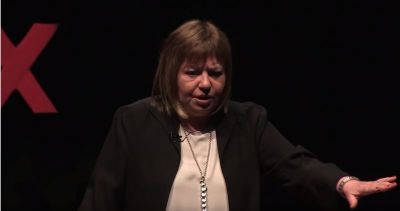Teen Vogue pushes prostitution as legit profession, like a medical doctor; feminists enraged

Teen Vogue is pushing the idea that prostitution is acceptable to its young readers.
In a Friday op-ed called "Why Sex is Real Work," Tlaleng Mofokeng, a medical doctor, noted that sex tourist destination Amsterdam will soon legally bar guided tours through the red light district but that many "sex workers," — a euphemism for prostituted persons but is often used to include brothel keepers and pornographers — are opposing the ban.
"Not all sex workers engage in penetrative sex, though, undeniably, that is a big part of sex work. Sex-worker services between consenting adults may include companionship, intimacy, nonsexual role playing, dancing, escorting, and stripping. These roles are often pre-determined, and all parties should be comfortable with them," she explained.
Mofokeng then compared the experiences of prostituted people with her own profession as a doctor.
"I exchange payment in the form of money with people to provide them with advice and treatment for sex-related problems; therapy for sexual performance, counseling and therapy for relationship problems, and treatment of sexually transmitted infection. Isn't this basically sex work?" she asked.
"I do not believe it is right or just that people who exchange sexual services for money are criminalized and I am not for what I do. Is a medical degree really the right measure of who is deserving of dignity, autonomy, safety in the work place, fair trade and freedom of employment? No. This should not be so. Those who engage in sex work deserve those things, too."
She went on to argue that continuing to criminalize prostitution harmfully impacts women and trans-identified males who call themselves women, and therefore, "sex worker rights" constitute a feminist and women's rights issue.
Actual feminists and others opposed to decriminalizing prostitution are not having it.
“Teen Vogue is grooming a generation of young girls into prostitution—one of the most violent, dehumanizing, and traumatizing industries on the planet and convincing them that this form of violence against women is a good 'job' option," said Laila Mickelwait, director of abolition at Exodus Cry, in a Monday interview with The Christian Post.
"Promoting prostitution to young girls is not only pushing them toward sexual exploitation but is also effectively promoting sex trafficking, because according to both domestic and international law, anyone under the age of 18 that is prostituted is legally a victim of sex trafficking," she continued, adding that the publication should be reprimanded for pushing the normalization of sexual violence and exploitation upon the thousands of impressionable girls who read it.

Writing on her Facebook page Monday, Gail Dines, a fervent anti-porn feminist and founder of Culture Reframed, concurred.
"They sanitize the reality of prostitution by making the absurd claim that: 'The idea of purchasing intimacy and paying for the services can be affirming for many people who need human connection, friendship, and emotional support,'" Dines explained.
"Yes, the john is absolutely looking for intimacy, connection, friendship and support as he pays to rape a prostituted girl or woman! How do you make sense of this as a girl growing up in a porn culture surrounded by a coherent narrative that women = sex?," she wrote.
Similarly, Lauren Hersh, national director of World Without Exploitation opined in a Monday Medium essay in response to the Teen Vogue op-ed that a doctor offering treatment for sexually transmitted infections is nothing like "sex work."
Hersh is also a former New York City special victims prosecutor.
"Most in prostitution experience devastating harm — physically, mentally and sexually. The rate of physical and sexual abuse among people in prostitution is staggering. The majority of those exploited in the sex trade experience post traumatic stress disorder that is destructive and often long term," Hersh explained.
Those who are prostituted ought to be decriminalized, but the pimps and sex buyers should be held accountable, she maintained.
"As the mother of a daughter, I feel sick that your magazine is selling our daughters the regressive belief that their bodies should be commodified and that commodification, exploitation, and trauma should be empowering for them. But as the mother of a son, I feel raging mad that in the middle of this #MeToo moment, your magazine is sending my son the misogynistic message that purchasing women and girls is legitimate and harmless."
In July of 2017, to the disgust of women's rights advocates, the publication promoted the idea that anal sex is a "delightful" experience for young girls, and referred to females throughout the article as "non-prostate owners."
Owned by mass media company Condé Nast, the print edition of Teen Vogue was scrapped a few months later.




























